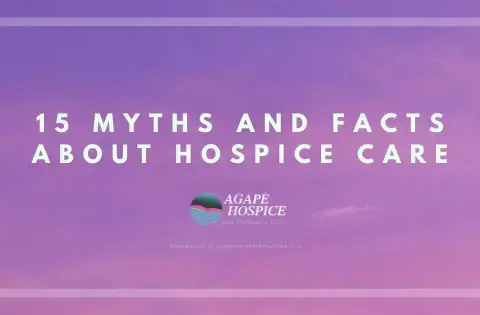When Is It Time to Call Hospice?
Signs It’s Time to Contact Hospice Care
Caring for a loved one with a serious illness brings lots of challenges. While caregivers often get a sense of fulfillment from caring for a loved one, as the illness progresses, they may begin to wonder when it’s time to focus on comfort rather than a cure. For caregivers in Los Angeles and Orange Counties, it’s important to recognize when hospice might be the best option. Agape Hospice & Palliative Care is here to be your guide as you decide whether in-home hospice is the right next step.
When to Call Hospice
Before going any further, we want to highlight that hospice care isn’t about giving up on a curative treatment. Instead, it’s about improving quality of life and ensuring dignity during a loved one’s final stages. If any of the following apply to your loved one, it may be time to call a hospice provider.
1. Frequent Hospitalizations or Doctor Visits
If your loved one has been making frequent trips to the hospital or their doctor in a short period, it may be a sign that their condition is worsening. Repeated emergency room visits or hospital admissions for the same issues may mean that treatments aren’t working, and palliative care is a better option. Don’t hesitate to speak with your loved one’s medical team about the effectiveness of treatment and whether advanced care planning is necessary.
2. Declining Ability to Perform Daily Activities
Activities like bathing, dressing, eating, and walking can become increasingly difficult for someone with a life-limiting illness. If your loved one is relying more and more on others for these basic tasks, it could signal that hospice care is needed. Hospice care teams include nurses and aides who can assist with these daily activities, easing the burden on family caregivers while ensuring your loved one’s comfort and dignity.
3. Chronic Pain That’s Hard to Manage
Uncontrolled or severe pain can significantly impact a person’s quality of life. Pain that persists despite treatments or requires stronger interventions may indicate the need for a shift in care goals. While in hospice care, your loved one will receive help with pain management from highly skilled home health aides. The team at Agape Hospice & Palliative Care can tailor treatments to reduce pain and improve overall well-being.
4. Rapid Decline in Physical or Cognitive Abilities
Progressive weight loss, extreme fatigue, muscle atrophy, or mental confusion are all signs of significant physical and cognitive decline. If you notice your loved one losing interest in eating, drinking, or keeping up with normal conversations, these changes may indicate that the end of life is approaching. Hospice care can address many of these symptoms, including appetite loss and cognitive decline, with a gentle and compassionate approach.
5. Your Loved One’s Wishes Have Changed
One of the most common indicators that hospice may be the right choice is when your loved one begins expressing a desire to stop seeking curative treatments. They may feel the burdens of treatments such as chemotherapy and surgery outweigh the benefits. Hospice care provides an alternative that focuses on comfort, emotional well-being, and maintaining dignity without the stress of continued interventions.
6. Recurring or Worsening Symptoms
Is your loved one reporting nausea, chronic discomfort, and breathlessness despite treatment? Perhaps these symptoms are becoming more severe over time. This could mean that curative treatments are no longer effective. Hospice not only addresses these symptoms but offers relief in the comfort of your loved one’s home.
7. A Caregiver Feeling Overwhelmed
Caregiving is an act of love, but it can also be physically and emotionally draining. If you find yourself overwhelmed, exhausted, or unsure how to manage your loved one’s increasing needs, it’s a sign that professional support is necessary. Hospice isn’t just for the patient—it’s also for the family. Our team provides a range of services, from emotional counseling to respite care, to take some of the stress off your shoulders.
Take the Next Step With Agape Hospice & Palliative Care
The decision to contact hospice is emotional, but you don’t have to face it alone. If any of these seven signs resonate with your experience, don’t wait to reach out to our team. We understand that deciding when to contact hospice is easier said than done, but we strive to create the most positive experience possible during this difficult time. Get in touch with us today to learn more about how hospice at home can help your loved one live their final weeks in comfort.


